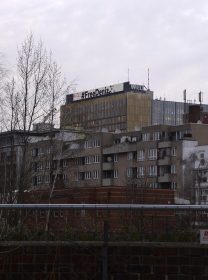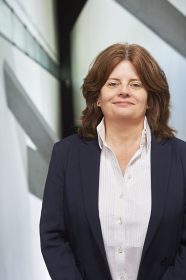
View from the Academy of the Jewish Museum Berlin towards the Springer building with the lit-up sign, #FreeDeniz; Jewish Museum Berlin, photo: Stefanie Haupt
As I leave my office at the Jewish Museum Berlin, emerging from the W. Michael Blumenthal Academy onto the street, the hashtag “#FreeDeniz” beams towards me from an illuminated black-on-turquoise-green display on the Axel Springer building. The first time I saw it, I was cheered by the signal that the publishing house Axel Springer SE* was calling for the release of Die Welt’s correspondent in Turkey, Deniz Yücel. But each day seeing the display has gotten sadder. I’ve known Deniz Yücel since 2003, when — together with other German- and Turkish-speaking Berliners — he organized bilingual protests against the bomb attacks on the two Istanbul synagogues, Neve Shalom and Beth Israel, on November 15 of that year. Twenty-four people were killed in those attacks and at least 300 wounded.
Deniz and I haven’t had contact for quite awhile. But since mid-February, through the news of his imprisonment for “terrorist propaganda” and the car procession protests that followed it, as well as conversations with friends and of course the illuminated sign, memories from the period in 2003 and 2004 when we interacted almost weekly having been coming back. → continue reading
New program director of the Jewish Museum Berlin holds lecture for future museum generation
1) Dear Mrs. Meijer-van Mensch: over the last years you have worked for various institutions in different countries. What distinguishes the museum landscape in Germany from other countries in your opinion?

Program director Léontine Meijer-van Mensch puts much value upon the promotion of the future museum generation; Jewish Museum Berlin, photo: Yves Sucksdorff
First I would like to say that in Germany – contrary to the Netherlands – there is a widely supported notion that culture in general (and therefore museums) is important. It is stimulating to be able to work in such an environment. Before World War II German museology was very influential worldwide. After the war Germany lost its leading position and new developments in the international museum world were not always fully embraced. An example is the importance of education and the role of educators within the organization of the museum. → continue reading
This year’s “Hellas Filmbox Berlin” (18–22 January 2017), a Greek film festival established in 2015 to highlight the current Greek film scene and present it to a German audience, features five films in the special history section on Greek Jews in the Holocaust and Greece under German occupation: → continue reading

